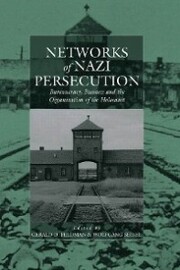Detailansicht
Networks of Nazi Persecution
eBook - Bureaucracy, Business and the Organization of the Holocaust, War and Genocide
ISBN/EAN: 9780857457073
Umbreit-Nr.: 2155890
Sprache:
Englisch
Umfang: 392 S.
Format in cm:
Einband:
Keine Angabe
Erschienen am 01.12.2004
Auflage: 1/2004
E-Book
Format: EPUB
DRM: Adobe DRM
- Zusatztext
- <p> The persecution and mass-murder of the Jews during World War II would not have been possible without the modern organization of division of labor. Moreover, the perpetrators were dependent on human and organizational resources they could not always control by hierarchy and coercion. Instead, the persecution of the Jews was based, to a large extent, on a web of inter-organizational relations encompassing a broad variety of non-hierarchical cooperation as well as rivalry and competition. Based on newly accessible government and corporate archives, this volume combines fresh evidence with an interpretation of the governance of persecution, presented by prominent historians and social scientists.</p>
- Kurztext
- The persecution and mass-murder of the Jews during World War II would not have been possible without the modern organization of division of labor. Moreover, the perpetrators were dependent on human and organizational resources they could not always control by hierarchy and coercion. Instead, the persecution of the Jews was based, to a large extent, on a web of inter-organizational relations encompassing a broad variety of non-hierarchical cooperation as well as rivalry and competition. Based on newly accessible government and corporate archives, this volume combines fresh evidence with an interpretation of the governance of persecution, presented by prominent historians and social scientists.
- Autorenportrait
- <p><b>Wolfgang Seibel</b> is Professor of Political Science at the University of Konstanz, Germany. Previous appointments include guest professorships at the Institute for Advanced Study, Vienna (1992), and the University of California at Berkeley (1994). He was also a temporary member of the School of Social Science (1989/90) and of the School of Historical Studies (2003) of the Institute of Advanced Study, Princeton. Currently (2004/2005) he is a fellow of the Wissenschaftskolleg zu Berlin. His research is mainly devoted to issues of politics, public bureaucracy and non-governmental organizations.</p>
